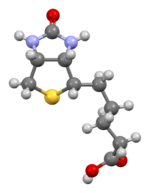Biotin facts for kids
Quick facts for kids Biotin |
|
|---|---|
 |
|
 |
|
|
Preferred IUPAC name
5-[(3aS,4S,6aR)-2-Oxohexahydro-1H-thieno[3,4-d]imidazol-4-yl]pentanoic acid
|
|
| Other names | Vitamin B7 |
| Identifiers | |
| CAS number | |
| PubChem | |
| DrugBank | DB00121 |
| KEGG | D00029 |
| ChEBI | CHEBI:15956 |
| SMILES | O=C1N[C@@H]2[C@@H](SC[C@@H]2N1)CCCCC(=O)O |
|
InChI
InChI=1/C10H16N2O3S/c13-8(14)4-2-1-3-7-9-6(5-16-7)11-10(15)12-9/h6-7,9H,1-5H2,(H,13,14)(H2,11,12,15)/t6-,7-,9-/m0/s1
|
|
| Properties | |
| Molecular formula | |
| Molar mass | 0 g mol-1 |
| Appearance | White crystalline needles |
| Melting point | |
| 22 mg/100 mL | |
| Pharmacology | |
| ATC code | |
| Hazards | |
| NFPA 704 |
|
| Except where noted otherwise, data are given for materials in their standard state (at 25 °C, 100 kPa) | |
Biotin, also known as vitamin B7, is one of the B vitamins. These are nutrients our bodies need to stay healthy. Every living cell, from plants to animals to people, uses biotin. It acts as a helper for special proteins called enzymes, which speed up chemical reactions in the body. These reactions help us get energy from the fats, carbohydrates, and proteins in our food.
You can get biotin from foods like meat and eggs, or as a dietary supplement. The name biotin comes from the Ancient Greek word bíotos, which means "life."
Contents
Why Your Body Needs Biotin
Biotin is a super important helper for your body's chemistry. Its main job is to help five key enzymes, called carboxylases, do their work. Think of biotin as a key that turns these enzymes on.
These enzymes are involved in important processes like:
- Making fatty acids: These are building blocks for your body's cells.
- Creating glucose: Your body can make its own sugar (glucose) for energy when needed. This process is called gluconeogenesis.
- Breaking down amino acids: When you eat protein, your body breaks it down into amino acids. Biotin helps process some of these.
Without biotin, these important jobs wouldn't get done correctly, which would affect your energy levels and overall health.
How Much Biotin Do You Need?
Health experts have created guidelines for how much biotin people need each day. These are called "Adequate Intakes" (AIs). The amount you need changes as you get older.
Here is a simple chart showing the recommended daily amount of biotin in micrograms (μg). A microgram is very tiny—one millionth of a gram!
| Age Group | Biotin AI (μg/day) |
|---|---|
| 0 to 6 months | 5 |
| 7 to 12 months | 6 |
| 1 to 3 years | 8 |
| 4 to 8 years | 12 |
| 9 to 13 years | 20 |
| 14 to 18 years | 25 |
| 19 years and older | 30 |
| Pregnant females (14 to 50 years) | 30 |
| Lactating females (14 to 50 years) | 35 |
It's very hard to get too much biotin from food. Your body just gets rid of any extra when you go to the bathroom.
Foods That Contain Biotin
Biotin is found in many different foods, so it's usually easy to get enough from a balanced diet. Cooking doesn't destroy biotin, which is great!
Here are some foods that are good sources of biotin:
| Source | Amount (μg/100 g) |
|---|---|
| Beef liver | 31 |
| Whole eggs | 10 |
| Salmon, pink, canned in water | 5 |
| Pork chop | 4 |
| Hamburger patty | 4 |
| Sunflower seeds, roasted | 3 |
| Sweet potato, cooked | 2 |
Did you know that healthy bacteria living in your intestines can also make biotin for your body to use?
What Happens If You Don't Get Enough Biotin?
Not getting enough biotin is called a biotin deficiency. This is very rare because biotin is in so many foods. When it does happen, symptoms can be mild, like thinning hair, brittle fingernails, or a skin rash.
Genetic Conditions
Some people are born with a genetic condition that makes it hard for their body to use biotin. The most common one is called biotinidase deficiency. This means they are missing an enzyme that recycles biotin.
Babies in many countries are tested for this condition right after they are born. If they have it, they can take biotin supplements for their whole life to stay healthy. Without treatment, this condition can be very serious.
Biotin in Science and Medicine
Biotin has some very cool uses outside of just being a vitamin.
A Tool for Scientists
Scientists use biotin in the lab as a kind of "sticky tag." They can attach biotin to a protein or other molecule they want to study. Then, they use another protein called avidin (found in egg whites), which binds to biotin incredibly tightly. It's like a super-strong magnet. This allows scientists to pull the tagged molecule out of a mixture to study it.
A Warning About Supplements
Many people take biotin supplements for healthier hair and nails. However, taking very high doses of biotin can cause problems with some medical lab tests. The technology used in these tests can get confused by the extra biotin in the blood.
This can lead to incorrect test results for things like thyroid hormones. If you take biotin supplements, it's very important to tell your doctor before you have any blood tests. They will probably ask you to stop taking the supplements for a few days before the test.
The Discovery of Biotin
The story of biotin's discovery began in the early 1900s. Scientists noticed something strange when they fed animals a diet that was high in raw egg whites. The animals started to lose their hair, get skin rashes, and have other health problems. They called this "egg-white injury."
For years, researchers tried to figure out what was causing this. In 1936, scientists Fritz Kögl and Benno Tönnis finally isolated a substance from egg yolk that could prevent this injury. They named it biotin, from the Greek word for "life."
Later, another scientist named Paul Gyorgy was studying the same problem. He called the mystery substance "Vitamin H" (the H stood for Haut und Haar, the German words for "skin and hair").
Eventually, everyone realized they had all discovered the same thing! They also figured out that raw egg whites contain a protein called avidin, which binds to biotin and stops the body from using it. Cooking the egg whites deactivates the avidin, which is why cooked eggs are perfectly safe and a good source of biotin.
Can Biotin Help with Health Problems?
Scientists are always researching how vitamins might help with different health conditions.
Hair, Skin, and Nails
Biotin is very popular in supplements that claim to make hair and nails stronger. While biotin is essential for healthy hair and skin, there is not much scientific proof that taking extra biotin helps if you are already a healthy person who gets enough from your diet. For people with a rare biotin deficiency, taking supplements does help improve their hair and nails.
Multiple Sclerosis
Some researchers have studied whether very high doses of biotin could help people with multiple sclerosis (MS), a disease that affects the brain and nerves. The idea was that biotin might help repair the protective coating around nerve cells. However, studies have shown mixed results, and there is no clear evidence that it is an effective treatment.
Biotin for Animals
Biotin isn't just important for people; animals need it too!
- Cattle: Biotin is very important for keeping a cow's hooves healthy. Unhealthy hooves can make it painful for a cow to walk, which means it might not eat enough or produce as much milk. Adding biotin to their feed can help keep their hooves strong.
- Horses: Many horses suffer from cracked or brittle hooves, which makes it hard to attach horseshoes. Horse owners often give their horses biotin supplements to help them grow stronger, healthier hooves. It takes several months to see a difference because the entire hoof has to grow out.
See also
- Biotin deficiency
- Biotin sulfoxide
- Biotinidase deficiency
- Biotinylation
- Multiple carboxylase deficiency
- Photobiotin
 | William L. Dawson |
 | W. E. B. Du Bois |
 | Harry Belafonte |


